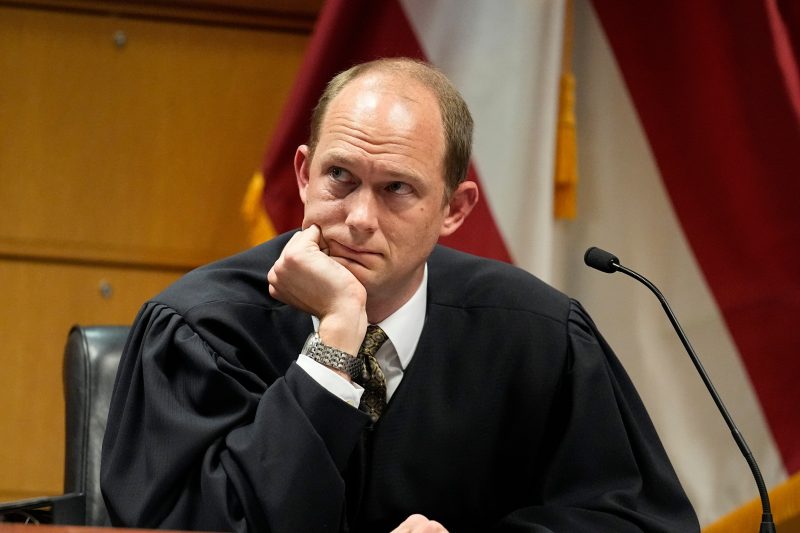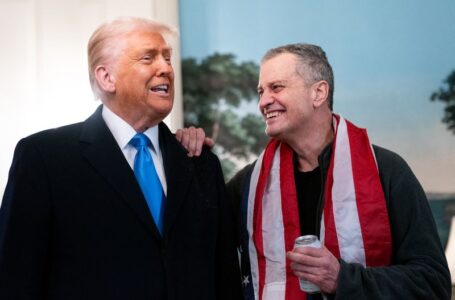Russian released as part of Fogel exchange and will return home soon, Kremlin says
Trump’s Georgia case hangs on key decision of a relatively new judge


ATLANTA — In coming days, a millennial judge who just marked his first year on the bench is expected to decide if the Georgia criminal case implicating a former president should be thrown out or reassigned because of misconduct allegations against the district attorney, his former boss, that center on her sex life.
Fulton County Superior Court Judge Scott McAfee was randomly assigned to oversee the racketeering case against former president Donald Trump and a cast of close advisers and allies who are accused of plotting to overthrow a legitimate election to keep Trump in power.
But the case has mostly been on hold for the past two months after one of Trump’s co-defendants accused Fulton County District Attorney Fani T. Willis (D) of hiring a “boyfriend” to lead the investigation and taking “vacations across the world” that he paid for, a claim Willis has vigorously denied. McAfee held an evidentiary hearing on the allegations that stretched more than 20 hours over four days and was broadcast live, including on McAfee’s courtroom YouTube channel.
Now he must decide what to do.
McAfee has given few hints on which way he’s leaning but has promised a decision by Friday.
“An order like this takes time to write. There’s a lot that I have to go through,” McAfee said in a local radio interview last week, adding that he already had a rough draft. “I am calling it as best I can and the law as I understand it.”
McAfee’s ruling is likely to be a career-defining moment for the 34-year-old rookie judge. His decision, whatever it is, will almost certainly be questioned by pundits and legal analysts because of its implications for Trump’s 2024 bid for the White House. And it is sure to draw political attacks — and probably harassment and threats — in an already contentious election year in which he, Willis and Trump will each be on the ballot.
Disqualifying Willis and her team of prosecutors would almost certainly delay, if not outright end the criminal case against Trump, one of four he faces. Allowing Willis to stay on the case is sure to spark defense requests for appeal — which McAfee would have to approve — and anger Trump’s supporters. Prosecutors have argued “mere appearance” should not be the standard for Willis’s removal, while defense attorneys have argued that’s more than enough.
The effort to remove Willis has unfolded like a legal soap opera, as embarrassing details emerged from Willis’s life and attorneys on both sides accused one another of lies and unethical conduct. A days-long evidentiary hearing included discussions of stockpiles of cash, tropical cruises and Willis’s preference of Grey Goose vodka over wine.
In a proceeding that seems almost tailored for high drama, McAfee has emerged in his own distinctive role — the youngest member of the Fulton County bench who has enjoyed a meteoric rise on the Georgia legal scene since he passed the bar a little over a decade ago. The mild-mannered judge has become quickly known for his calm, almost opaque demeanor in wrangling the sprawling case with its array of colorful defendants and lawyers with big, often clashing personalities that would test even the most experienced members of the judiciary.
The judge is already familiar with some of the players. One of McAfee’s earliest jobs was prosecuting homicides in the Fulton County district attorney’s office where Willis, at one point, was his supervisor. Willis confirmed in an interview with The Washington Post last year that McAfee had been one of her “baby attorneys” and was “immensely talented.”
McAfee, who also worked as a federal prosecutor, was appointed to the bench last year by Georgia Gov. Brian Kemp (R). Lawyers on both sides of the election case have privately praised McAfee as an intelligent and thoughtful judge who so far has been fair about allowing all sides to have their say and has been pushing the case forward at a notable clip, even as an official trial date has not yet been set.
Judicial races in Georgia are nonpartisan, and McAfee is not formally aligned with any political party as he campaigns for a full term on the Fulton County bench. But as a college student, McAfee led a College Republican chapter, and he was later involved in conservative legal groups including the Federalist Society while attending law school.
McAfee is lesser known and less experienced than the other three judges overseeing Trump criminal cases — U.S. District Judge Tanya S. Chutkan in Washington, U.S. District Judge Aileen M. Cannon in Florida and New York Supreme Court Justice Juan Merchan. But his courtroom is the only one with a video feed, and it is expected that Trump’s trial in Georgia, if it proceeds, would be the only televised one. That could turn McAfee into a nationally known figure, but it also puts increased pressure on him to keep his courtroom from turning into a reality television show.
McAfee nodded to that pressure to the New Yorker last September, one of few media interviews he’s granted since being named to oversee the case. (McAfee declined to comment for this article.) He said he had “no aspiration to become the next Judge Ito” — a reference to former Los Angeles County Superior Court Judge Lance Ito, who presided over the O.J. Simpson murder trial in 1995, a televised legal spectacle that drew tens of millions of viewers. McAfee also said he didn’t want to be “Judge Judy,” the infamous legal arbiter of syndicated daytime television.
But McAfee’s commitment to broadcast hearings in the election case — a standard policy in Fulton County where many court proceedings are streamed on YouTube — could render his desire to avoid being a TV judge unavoidable. Already more than 17,000 people follow his YouTube stream, even as he has otherwise maintained a low public profile online and in the community. But that could change as McAfee campaigns to keep his position.
While Trump has viciously attacked the other judges overseeing his criminal cases, he has said little about McAfee, recently calling him an “honorable judge.” Unlike other co-defendants in the case, Trump opted not to try to move his case from state to federal court. His attorney, Steve Sadow, said his client believed McAfee would be fair to him.
Several friends, former colleagues and others who know McAfee declined to be quoted by name. Many lawyers said it would be inappropriate to publicly talk about a judge who is likely to be on the bench for decades and could hear a case involving one of their clients.
But they described a smart legal mind deeply knowledgeable about criminal law with a reputation for being hard-working, professional and extremely patient — a key attribute for any judge, they argue, much less someone overseeing a case as sprawling as the one involving Trump. He’s just as cool and collected away from the cameras, they said.
Keith Blackwell, a retired Georgia Supreme Court justice for whom McAfee worked as a judicial intern in 2012, recalled McAfee actively discussing complicated cases and issues coming before the court. Even then, Blackwell recalled, McAfee had a disposition of a future judge.
“He’s very even-keeled. He’s not somebody who would become easily upset or flustered. He maintains his cool. He doesn’t really lose his temper. And so I think in that sense, he had the perfect temperament to be a judge generally, but especially for a case as high profile and contentious as this one,” Blackwell said.
McAfee and his former boss came face-to-face last month when Willis marched into his courtroom and announced she wanted to testify in the hearing on the misconduct claims against her — a decision that took her own staff by surprise. McAfee waved her onto the witness stand, where he referred to her as “Ms. Willis” and repeatedly had to remind her to maintain decorum.
Willis angrily confronted the defense attorney who first raised the allegations and accused her of “spreading lies.” McAfee sat quietly on the bench, his eyes darting back and forth between the women in what was a legal tennis match of wills. As Willis raised her voice, almost to a yell, McAfee, his brow furrowed, abruptly called a recess an in apparent effort to cool the temperatures.
When testimony resumed, McAfee urged all the lawyers to act like professionals. McAfee was equally stern with the team of defense attorneys as they one by one picked apart and challenged Willis’s testimony.
When one defense attorney talked over McAfee and Willis during his cross-examination of the district attorney, McAfee became visibly irritated and told him to “sit down now.” When the attorney continued to argue that Willis had not answered his question, McAfee replied: “And you are not listening to my answer either. We’re done.”
Married and the father of two young children, McAfee has spent his entire life in Georgia.
He grew up north of Atlanta in Kennesaw. His parents worked for Delta Air Lines. An accomplished cellist, he attended Emory University on a music scholarship, majoring in music and political science.
After his appointment to the Trump case last summer, a three-minute video went viral and showed McAfee playing a rousing rendition of Jimi Hendrix’s version of “The Star Spangled Banner” on electric cello during a high school contest. McAfee told the New Yorker that he made extra money during college playing weddings and briefly served as a studio session cellist during the recording of a Janelle Monáe record — though his part was cut.
After graduating from Emory in 2010, McAfee enrolled at the University of Georgia School of Law. He won awards in mock trial and moot court competitions and upon graduating in 2013 was named a member of the Order of the Barristers, an honor society for those who excelled in areas such as oral arguments and brief writing.
But it is McAfee’s extracurricular activities that have drawn some suspicion among those anxious to see the Georgia case against Trump proceed. While in law school, McAfee was vice president of the local chapter of the Federalist Society, a conservative law group, and treasurer for the Law Republicans. Speaking to the New Yorker, McAfee described his membership in the Federalist Society as a “networking opportunity” and “not a cabal.”
But just as McAfee’s conservative bona fides have roused suspicion on the left, so have his previous ties to Willis among those on the right. After brief stints in private practice and as a county prosecutor north of Atlanta, McAfee joined the Fulton County district attorney’s office in 2015 and was quickly promoted to the Major Case Division, where he prosecuted hundreds of murder and violent crime cases. Willis, a longtime Fulton County prosecutor who was elected as district attorney in 2020, supervised that division at the time.
It’s unclear if McAfee and Willis were personally close. In 2018, when McAfee was still working at the district attorney’s office, McAfee’s wife contributed $101 to Willis’s campaign for Fulton County Superior Court judge — a race Willis ultimately lost. In 2020, McAfee contributed $150 to Willis’s campaign for district attorney, while his wife donated $99, according to campaign finance reports.
Last month, conservative media sites including Breitbart suggested that McAfee’s ties to Willis were a potential conflict of interest. Some Trump supporters called for McAfee to step aside — but that has not been echoed by any defendant in the election case.
In some ways, McAfee has already had a front-row seat to Trump’s attempts to undo his 2020 election loss in Georgia.
In late 2018, McAfee was appointed as an assistant U.S. attorney in the Northern District of Georgia, also in Atlanta, where he prosecuted cases including fraud, illegal firearms and drug trafficking. McAfee’s boss was at the time was U.S. Attorney Byung J. “BJay” Pak, a Trump-appointee who abruptly resigned in early 2021 after a colleague warned him Trump was planning to fire him because he had failed to validate claims of widespread election fraud.
Months after Pak resigned, McAfee was appointed by Kemp to be Georgia’s inspector general. Kemp, who was pressured by Trump to overturn the 2020 results and then attacked when he refused, is expected to be a star witness against the former president.
A little under two years later, Kemp appointed McAfee to replace a retiring judge on the Fulton County bench. Six months later, McAfee was assigned to the Trump case.
McAfee is now seeking a full four-year term, running on a platform that includes cutting the backlog of cases that piled up during the pandemic and “holding violent offenders accountable.” His campaign website makes no mention of the best-known case on his docket — but points to his commitment to “transparency” and his YouTube video feed of court proceedings.
Last week, McAfee drew two challengers for his election on May 21 — Robert Patillo, a civil rights attorney, and Tiffani Johnson, a staff attorney for another Fulton County judge. The nonpartisan judicial election will appear on the same ballot as partisan primary races, including district attorney. A runoff, if needed, would happen in June.
Patillo has noted that the Trump election case has moved at a faster clip than prosecutions of lesser-known defendants who have been sitting in jail for years waiting for their trials. He called the Willis removal hearings a “giant reality show” that has embarrassed Atlanta. “Tell me that looks like a well-run courtroom,” Patillo told the “Shelley Wynter Show,” a conservative radio program.
The next day, McAfee called in to the same show. He did not respond to Patillo’s comments about the Trump case, but said he inherited a docket where 25 defendants had been in jail for more than 1,000 days — and that number is now 10.
“We have been attacking this backlog with everything I’ve got. We’ve been just doing jury trial after jury trial,” McAfee said, adding that he has presided over more than 25 murder trials. “People maybe don’t see all of the cases that I’ve handled. Maybe one of them gets most of the attention.”
Sadow, Trump’s attorney, suggested last week that Patillo had been “chosen” to run against McAfee by a “pro-Willis faction to put political pressure on the court to rule in her favor.” Patillo publicly denied it. McAfee dismissed it.
“I’m not one to jump into conspiracy theories like that,” McAfee said. And even if it were true, he added, “it is absolutely not going to play into my decision in any way. No job is worth my integrity.”
McAfee said he contemplates a day when his children, now ages 5 and 3, are old enough to ask him about the cases he has handled.
“I’m looking forward to looking them in the eye and telling them I played it straight,” he said, “and I did the best I could.”
Marianne LeVine contributed to this report.











